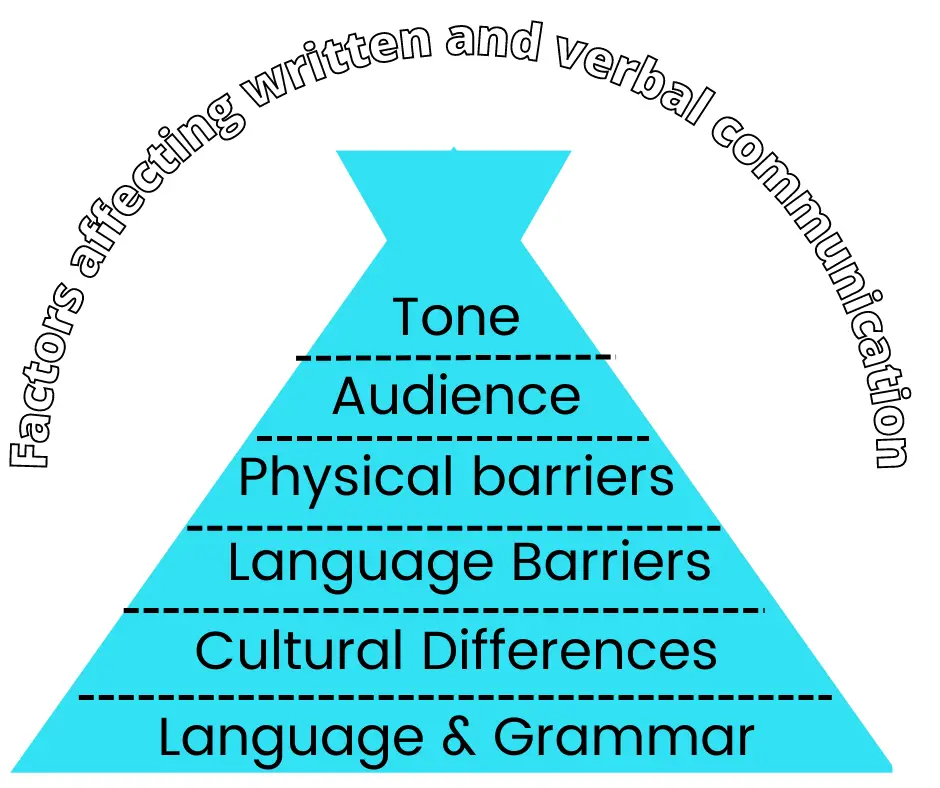Effective communication is essential for building and maintaining successful relationships, both personal and professional. However, several factors can influence the effectiveness of communication between individuals or groups.
Understanding the factors that impact communication is critical to developing effective communication skills and building strong relationships with others. In this blog, we will explore 10 critical factors that affect communication and the factors that do not affect communication.
10 Factors Affecting Communication
Communication is affected by various factors, which can either enhance or hinder the transmission of information. In this section, we will look at 10 factors that impact the communication process:
1) Choice of Medium:
The choice of medium can significantly affect communication, as different mediums have varying strengths and weaknesses in terms of their ability to convey information effectively.
For example, face-to-face communication is often considered the most effective medium, as it allows for the use of nonverbal cues, such as facial expressions and body language, which can help to reinforce the meaning of the message.
Related Reading: Merits and demerits of face-to-face communication
For complex messages, it may be better to use a medium that allows for more detailed explanations, such as a written report or a presentation.
2) Language Concern:
Language concerns are a crucial factor that affects communication, particularly in cross-cultural communication, where language barriers can arise due to differences in language proficiency or understanding.
Language concerns can include difficulties with vocabulary, grammar, pronunciation, and tone, all of which can affect the clarity and accuracy of the message being conveyed. For example, a non-native speaker may have difficulty expressing complex ideas in a second language, leading to misunderstandings or misinterpretations of the message.
3) Information Overload/Excess of Information:
Information overload can lead to difficulties in processing and interpreting information accurately, which can result in confusion, stress, and reduced productivity.
When faced with information overload, individuals may struggle to identify the most important information, leading to a loss of focus and attention. The sheer volume of information can also cause individuals to feel overwhelmed and anxious, which can affect their ability to communicate effectively.
4) Lack of Feedback:
Lack of feedback can affect communication, particularly in situations where there is a sender and a receiver of information.
Feedback refers to the information or response provided by the receiver to the sender, indicating that the message has been received and understood. When feedback is lacking, it can lead to misunderstandings, confusion, and a breakdown in communication.
5) Time and Distance:
Time and distance are two significant factors that can affect communication, particularly in situations where the sender and receiver are separated by physical or temporal barriers. Time and distance can affect communication in several ways, such as:
- Delayed Response: When the sender and receiver are in different time zones or locations, there may be a delay in response times.
- Misinterpretation: When the sender and receiver are separated by distance, there may be a lack of visual or nonverbal cues that can be critical to understanding the message accurately.
- Technical Barriers: Distance can also lead to technical barriers, such as poor internet connectivity or network issues, which can affect the quality and reliability of communication.
6) Selective Perception:
Selective perception is a factor that can affect communication, particularly in situations where individuals filter information based on their personal beliefs, values, attitudes, and experiences.
It can lead to misunderstandings and a breakdown in communication, as individuals may interpret the same message differently based on their personal biases and perspectives.
For example, individuals may selectively perceive information that confirms their existing beliefs and ignore information that challenges their beliefs, leading to a lack of critical thinking and a limited understanding of the issues at hand.
7) Cultural Factor:
Culture is a significant factor that can affect communication, particularly in situations where individuals from different cultural backgrounds interact with each other. Culture can affect communication in several ways, such as:
- Language: Different cultures may have different languages or dialects, which can lead to difficulties in understanding and interpreting messages accurately.
- Nonverbal Communication: Different cultures may have different norms and expectations regarding nonverbal communication, such as gestures, facial expressions, and body language.
Related Reading:
What is Non-Verbal Communication: Examples, Types & Importance
8) Clarity of Message:
Clarity of the message is a critical factor that can affect communication. Clarity refers to the degree to which a message is clear, concise, and easily understood by the receiver.
When the message is not clear, it can lead to misunderstandings, confusion, and a breakdown in communication. To ensure clarity in communication, it is essential to use clear and concise language, organize the message in a logical and structured manner, and deliver the message in a way that is appropriate for the audience.
9) Use of Technical Language:
The use of technical language can be an important factor that affects communication. Technical language refers to specialized vocabulary or terminology that is specific to a particular field, industry, or profession.
While technical language can be useful for conveying precise and detailed information to those with expertise in a specific field, it can also create communication challenges when used with individuals who are not familiar with the technical terms.
10) Emotional Factors:
Emotional factors can greatly affect communication. Emotions can influence how individuals perceive, interpret, and respond to messages, leading to communication challenges and misunderstandings. Some emotional factors that can affect communication include:
- Stress: Stress can cause individuals to become overwhelmed, leading to a lack of focus and attention.
- Anger: Anger can cause individuals to become defensive, leading to a breakdown in communication.
- Anxiety: Anxiety can cause individuals to become self-conscious and hesitant, leading to a lack of confidence in their ability to communicate effectively.
- Empathy: When individuals are empathetic, they are more likely to listen actively, show interest, and respond in a positive way.
Factors Influencing Types of Communication
In this section, we will look at how various factors influence the different types of communication.
Factors Affecting Written Communication
Written communication can be influenced by several factors that can impact its effectiveness and clarity. Listed below are some factors that can affect written communication:
1. Language and Grammar: The choice of words, sentence structure, and grammatical errors can affect the clarity and effectiveness of written communication.
2. Audience: It is essential to consider the audience’s background, knowledge, and interests when crafting written communication to ensure that the message is relevant, engaging, and easily understood.
3. Tone: The use of a harsh, critical, or negative tone can lead to defensiveness or hostility, while a positive and supportive tone can foster collaboration, engagement, and motivation.
Related Reading: Check out our detailed article on written communication merits and demerits.
Factors Affecting Verbal Communication
Verbal or oral communication flow is influenced by various factors that can affect the way people communicate with each other. This includes the following factors:
1. Language Barriers: When people speak different languages or dialects, it can be difficult to understand one another. Even when people speak the same language, differences in accent or slang can create confusion.
2. Cultural Differences: Different cultures have different communication styles, and what is considered polite or appropriate in one culture may not be in another.
3. Physical barriers: Physical barriers such as distance, noise, and environmental disturbances can make it difficult to hear or understand what someone is saying.
Related Reading:
What are the advantages and disadvantages of verbal communication
What are the advantages and limitations of oral communication explained with examples

Variables Affecting Organizational Communication
Organizational communication is influenced by various variables that can affect the flow and effectiveness of communication within an organization.
Factors Affecting Marketing Communication
Marketing communication is the process of conveying information about a product or service to a target audience. There are various factors that can affect the effectiveness of marketing communication. They are:
1. Nature of the Market: The nature of the market is a critical factor in marketing communication. Effective communication requires a thorough understanding of the target audience’s needs, preferences, and behavior.
2. Brand image: The brand image is the perception of the brand in the minds of the target audience. A strong brand image can enhance the effectiveness of marketing communication, as consumers are more likely to trust and engage with a brand that they perceive positively.
3. Buyer Readiness Stage: An effective flow of communication towards consumers can help in identifying how eager buyers are towards purchasing a product or service.
Factors Affecting Communication in Crisis Management
Effective communication is crucial during crisis management to ensure that accurate and timely information is conveyed to the appropriate parties. Here are some of the factors that can affect communication during crisis management:
1. Speed: During a crisis, rapid communication is essential to ensure that everyone is informed about the situation as quickly as possible.
2. Accuracy: Inaccurate or misleading information can create confusion, increase panic, and lead to poor decision-making. It is therefore important to ensure that the information being communicated is accurate and up-to-date.
3. Clarity: Clear communication is essential during a crisis, as confusion can lead to chaos. It is important to use language that is easy to understand and to avoid jargon or technical terms that may not be familiar to all parties.
Factors Affecting Feedback in Communication
Several factors can impact the feedback that individuals receive in communication. This includes:
1. Timing: Feedback that is provided too quickly or too long after the message has been delivered can be less effective or less relevant.
2. Specific Feedback: The feedback provided should be specific and relevant to the situation at hand. General and vague feedback cannot be used to correctly identify areas of improvement.
3. Power Dynamics: Power dynamics between the sender and receiver can impact the feedback received. For example, individuals may be less likely to provide honest feedback to a boss or authority figure.
Related Reading: Detailed the importance of meaningful feedback in the process of communication
Factors Affecting Media Choice in Communication
Media choice refers to the selection of a specific channel or method for transmitting information or messages. Some factors affecting the choice of media are:
1. Cost: The cost of different communication channels can impact media choice. For example, video conferencing may be more cost-effective than travel for face-to-face meetings.
2. Urgency: The urgency of the message can impact the choice of media. If the message is time-sensitive or requires an immediate response, then real-time communication methods such as phone or video conferencing may be preferred.
3. Audience Preferences: The preferences of the audience can also influence media choice. For example, younger audiences may prefer social media or messaging apps, while older audiences may prefer email or phone communication.
What are the Factors that Do Not Affect Communication?
The factors that do not affect the communication process include:
1. Gender: Gender does not have any direct effect on communication. The way a person communicates depends on their individual style, experiences, and cultural background.
2. Age: Age does not necessarily affect communication. Older people may have more experience and wisdom to draw from, while younger people may be more familiar with newer forms of communication such as social media.
3. Physical Appearance: Physical appearance does not affect communication in most cases. While body language and facial expressions can convey emotions and attitudes, it is the content of the communication that matters most.
4. Personal Beliefs: Personal beliefs do not necessarily affect communication, although they may influence the way a person expresses themselves.
Top Barriers to Communication
There are several common barriers to effective communication. They include:
- Semantic Barriers: Semantic barriers can affect communication when people speak different languages, use technical jargon, or have different dialects or accents.
- Physical Barriers: Physical barriers can prevent communication, such as distance, noise, poor lighting, or technology malfunctions.
- Emotional Barriers: Emotional barriers can include fear, anxiety, anger, or mistrust that affect the way people interpret and respond to messages.
- Cultural Barriers: Cultural barriers can arise when people from different cultures have different communication styles, values, and norms.
- Organizational Barriers: Organizational barriers to communication can include hierarchy, poor management, lack of communication channels, and unclear roles and responsibilities.
Further Reading: Barrier to Effective Communication with Examples and Types
Frequently Asked Questions
Q1) What are the 4 factors that affect communication?
Ans. 4 factors that affect communication include the following: Language Concerns, Choice of Medium, Lack of Feedback, Time, and Distance.
Q2) What are the factors of communication?
Ans. Effective communication depends on several factors, including the sender, receiver, message, channel, context, and feedback. The sender is responsible for creating and delivering the message, while the receiver must be able to understand and interpret it correctly.
Q3) What are the factors affecting perspective in communication?
Ans. Perspective in communication can be influenced by factors such as language, tone, education and knowledge, past experience, culture, feelings, and environmental factors.



